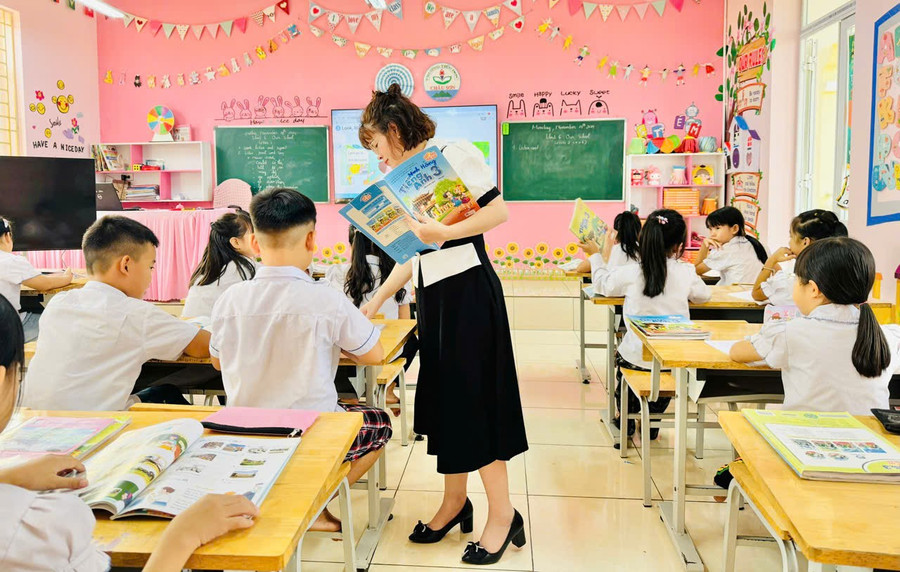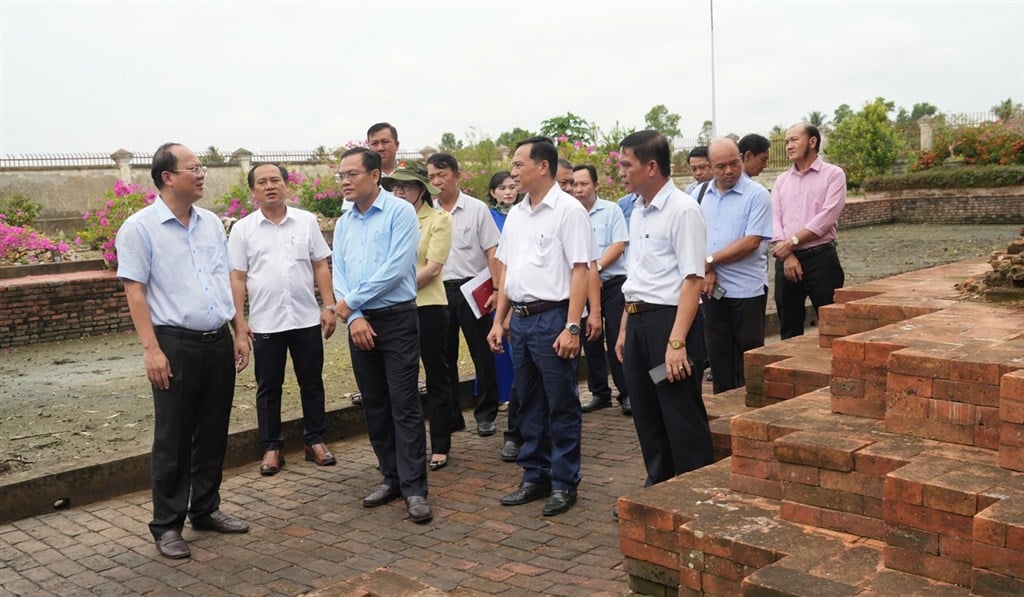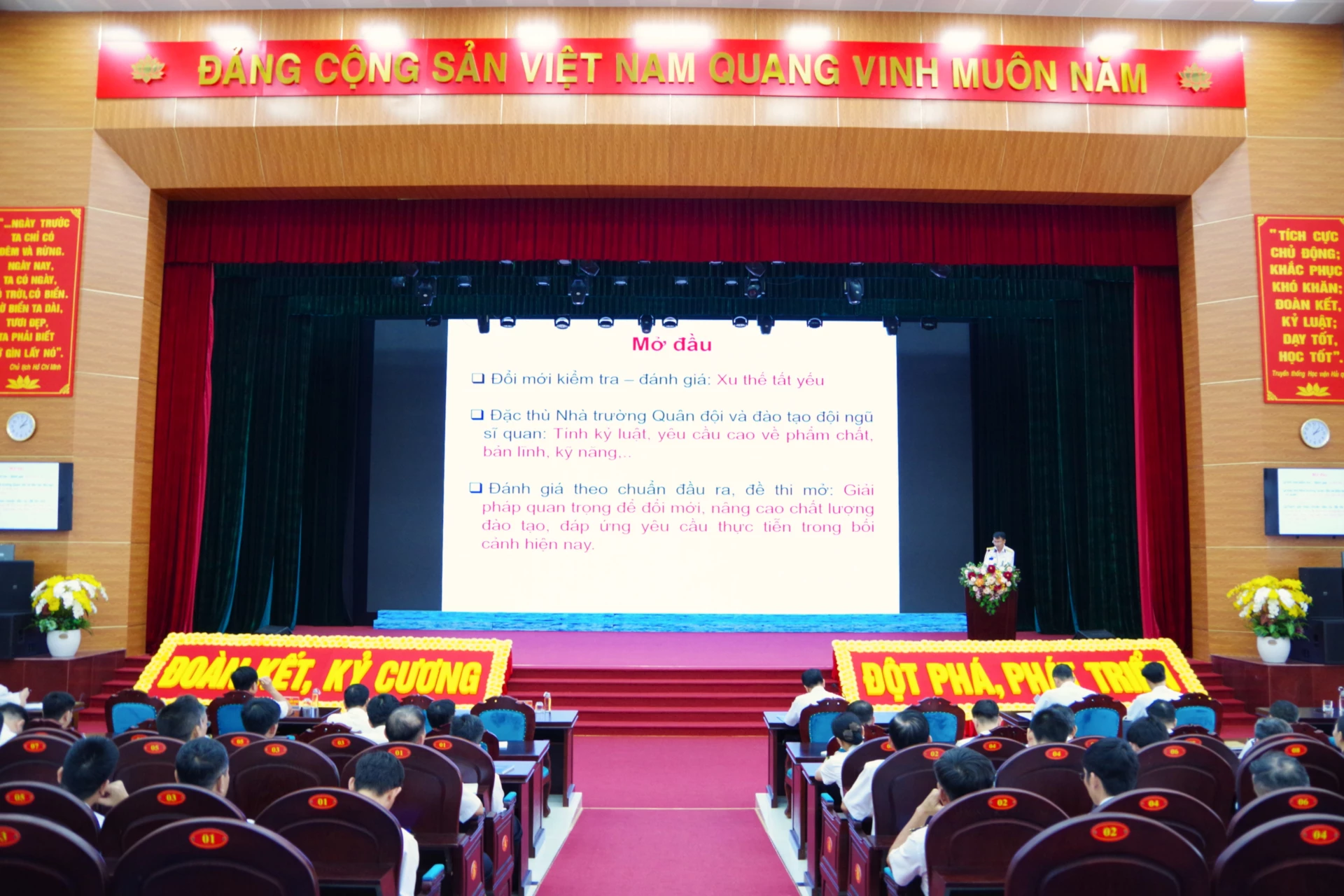In which, developing staff and improving the quality of training and fostering managers, teachers and English lecturers is one of the main solutions.
Identify advantages and challenges
Affirming the importance and necessity of improving the quality of foreign language teaching and making English the second language in schools, Mr. Nguyen Minh Tuan - Principal of Luu Van Mot Secondary School (Trung Thanh, Vinh Long) said that schools have basic advantages towards this goal. That is the policy foundation, clear orientation with a Government Project built on Conclusion No. 91-KL/TW of the Politburo , creating a solid legal basis for schools to implement English teacher training and development programs.
Another important advantage is the motivation from students and society. Currently, 100% of students from grade 3 are required to study English. The need to use English in society and the trend of international integration create motivation for teachers to improve their qualifications and improve teaching methods. Parents and students are well aware of the importance of English and are willing to cooperate and support activities to enhance English teaching and learning.
Besides the above advantages, the biggest challenge on the journey towards making English the second language in schools, according to Mr. Nguyen Minh Tuan, is the condition of the team. The English proficiency and pedagogical capacity of English teachers currently still differ significantly between regions.
Many teachers focus on teaching grammar and vocabulary, not on communication and reflex skills, making it difficult for students to use English in real life. Making English a second language requires a big change in thinking and methods, but not all teachers are willing or capable of doing so.
Tran Hung Dao Primary School (Eakar, Dak Lak ) currently has 3 English teachers and all 3 have met the English proficiency standards according to the 6-level competency framework. Ms. Luong Thi Hong - Principal of the school said that the team of young, enthusiastic teachers, always self-studying, self-training, ready to participate in training courses to improve professional qualifications are advantages of the school when implementing the Project "Bringing English as a second language in schools in the period 2025 - 2035, vision to 2045". In the teaching process, teachers have applied information technology to achieve the best results.
Regarding difficulties, according to Ms. Luong Thi Hong, the number of English teachers is currently not enough to meet the demand. The school has 28 classes, and the English teachers are only enough to teach grades 3, 4, and 5; for grades 1 and 2, the school has to contract with the social sector, which somewhat affects the overall quality.
Hue City is a unit with a long-standing educational tradition, the quality of teaching and learning is maintained stably. Particularly in foreign languages, especially English, teaching and learning work is strongly directed. Through the implementation of the Project "Improving the quality of teaching and learning foreign languages in the national education system", international cooperation programs, teacher training activities, development of foreign language learning environments, the quality and awareness of the importance of English in schools have been significantly improved.
In addition, the implementation of a two-level government is a breakthrough step, creating conditions for organizing a streamlined, synchronous, and effective education system, better meeting the requirements of innovation, including establishing English as a second language in schools.
Sharing this, Mr. Nguyen Mai Ngoc - Head of General Education Department, Department of Education and Training of Hue City added more information about the situation of English teachers in Hue City with the number of teachers meeting the competency standards according to the level of education (standard B2/C1) over 97%. The city has active support from the National Foreign Language Project through training courses to improve language proficiency and teaching methods for teachers; closely connecting with the University of Foreign Languages (Hue University) in training, organizing exams, providing professional support...
However, Mr. Nguyen Mai Ngoc stated that one of the biggest barriers today is the lack of teachers with foreign language proficiency standards; especially in remote areas where recruiting and training teachers faces many obstacles. Many teachers have limited English teaching skills and active teaching methods; organizing classes entirely in English is confusing.
The difference in quality of staff between regions is also clear. The mechanism for recruiting, training and rewarding English teachers is not flexible, and the ability to attract high-quality human resources is limited. There is a lack of funding to hire native teachers or implement a bilingual model, while this is a key factor in helping students have a standard language environment.

Be proactive
From identifying advantages and disadvantages, Mr. Nguyen Minh Tuan said that Luu Van Mot Secondary School has taken steps to prepare its staff and determine what needs to be done to be ready to implement the Project. Accordingly, the school reviewed the number, qualifications, pedagogical capacity and foreign language certificates of English teachers according to the 6-level Competency Framework.
Assess teachers' ability to apply communicative teaching methods, use information technology, and digital learning materials in teaching. Organize English proficiency tests (listening, speaking, reading, writing) according to the European reference framework (CEFR) for all English teachers. Based on the assessment results, classify teachers into groups (e.g.: Qualified, need further training, need retraining), helping to build a personalized development roadmap.
The school will make a detailed plan on the number of teachers who need to be trained, upgraded, and forecast the need for additional recruitment (if any). This plan needs to have specific goals, implementation time, and necessary resources.
At the same time, synchronously deploy solutions to improve teachers' qualifications and professional capacity, such as: Organizing intensive training courses, developing modern pedagogical capacity, cooperating with prestigious organizations to organize high-quality training courses, inviting experts to the school. If there is a shortage or need to increase qualified teachers, the school will proactively develop a recruitment plan.
For Tran Hung Dao Primary School, the solution shared by Principal Luong Thi Hong is to encourage teachers to exploit online courses, organize professional activities, and share teaching experiences in English. Build an English-speaking environment in the school, effectively implement English clubs, and communicate in English during extracurricular activities.
Ms. Luong Thi Hong also proposed increasing the recruitment quota for English teachers, having a policy of financial support for teachers to participate in advanced training, updating modern English teaching trends, digital skills, and diverse learning material design skills. Along with that, paying attention to investing in standard foreign language classrooms, equipping them with audio-visual equipment, and English learning software.
Lack of English teachers in primary schools is a common difficulty of Dak Lak province. Sharing this, Ms. Vo Thi Minh Duyen - Deputy Director of Dak Lak Department of Education and Training proposed that in the period of 2025 - 2030, we should focus on building a roadmap for regular training for English teachers on modern teaching methods, applying information technology, and developing language skills according to international standards (at least level 4 for primary school teachers, level 5 for secondary and high school teachers).
Encourage the participation of native teachers and international volunteers in supporting extracurricular activities and English clubs at school. Create forums and professional groups for teachers to share experiences, learn and develop together.
Vision to 2045: Deep international integration with increased student and teacher exchanges with English-speaking countries; encourage international training programs. Prioritize on-site and online teacher training programs, or send teachers to study in batches to reduce costs and travel time. Pilot models of teacher training in “pairs” or “school clusters” can be used.

Need practical policies
The policy for teachers is one of the solutions proposed by Mr. Nguyen Tien Dung - Head of Secondary Education Department, Nghe An Department of Education and Training, to gradually make English the second language in schools. The first is the mechanism to attract high-quality human resources by building a specific policy to attract good teachers and language experts; reviewing the salary and allowance regime for foreign language teachers.
The Politburo has directed that breakthrough mechanisms and policies are needed to attract foreign experts, scientists and overseas Vietnamese to teach at domestic educational institutions. Mr. Nguyen Tien Dung proposed facilitating work permit procedures and providing appropriate remuneration to encourage native teachers and international experts to work in Vietnam long-term.
With the above mechanism to attract high-quality human resources, the Head of the Secondary Education Department of Nghe An Department of Education and Training proposed a mechanism for teacher training, ensuring funding sources, procedures in accordance with regulations but not cumbersome; a mechanism for short-term teacher training abroad to build a core team, acting as the backbone in implementing the Project.
Also interested in solutions for staff development, Mr. Nguyen Mai Ngoc - Head of General Education Department, Department of Education and Training of Hue City emphasized the need to strengthen staff training and development; prioritize recruiting young teachers with technological capacity and the ability to organize active and creative classes. For teacher training colleges, it is necessary to change the training method so that students can use foreign languages when participating in teaching at high schools.
From the perspective of general education institutions, Mr. Nguyen Minh Tuan - Principal of Luu Van Mot Secondary School said that it is necessary to have a detailed framework of standards on language, pedagogical and cultural competence for English teachers at each level. This standard must be institutionalized and applied uniformly nationwide. Set out a clear roadmap with specific deadlines for teachers to meet the standards. Organize periodic, public and transparent English and pedagogical competence tests.
Provide scholarships or support for international certification exams for teachers. Allocate a large and long-term budget for English teacher training and development programs. Cooperate with international organizations to implement online and on-site courses, especially for teachers in remote areas. Create conditions for Vietnamese teachers to study and practice abroad and invite foreign teachers to teach in Vietnam.
Mr. Nguyen Minh Tuan, local education managers, want to have an accurate assessment of the current situation of English teachers in each school in the area and forecast the needs in the coming years. Establish or upgrade provincial English teacher training centers, equip them with modern facilities and core teaching staff. Have a policy of financial support for teachers to study to improve their qualifications. At the same time, regularly check and evaluate the teaching quality of English teachers.
For schools, it is necessary to be proactive in developing the team. Part of the school budget can be spent on training and improving the qualifications of English teachers. Develop a policy of timely rewards and incentives for teachers with good achievements in studying and teaching.
Upgrade English classrooms, equip with modern facilities, libraries with rich English documents. Regularly organize professional activities, internal seminars for teachers to share experiences, discuss new teaching methods. Organize English clubs for teachers and students, encourage English communication in school activities.
Source: https://giaoducthoidai.vn/dua-tieng-anh-thanh-ngon-ngu-thu-hai-trong-truong-hoc-can-giai-phap-can-cot-ve-doi-ngu-post743461.html


























![[Photo] An Phu intersection project connecting Ho Chi Minh City-Long Thanh-Dau Giay expressway behind schedule](https://vstatic.vietnam.vn/vietnam/resource/IMAGE/2025/8/21/1ad80e9dd8944150bb72e6c49ecc7e08)





































![[Photo] Politburo works with the Standing Committee of Hanoi Party Committee and Ho Chi Minh City Party Committee](https://vstatic.vietnam.vn/vietnam/resource/IMAGE/2025/8/21/4f3460337a6045e7847d50d38704355d)

































Comment (0)